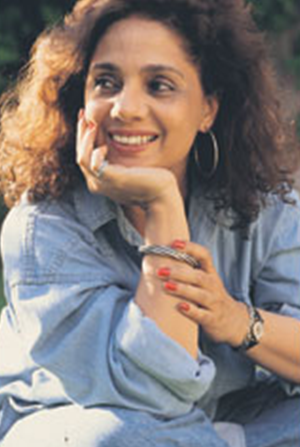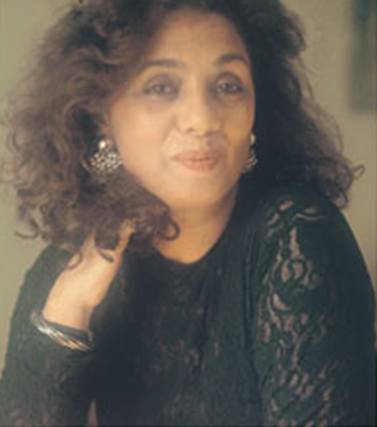Yasmeen Ismail
This is a collection of articles archived for the excellence of their content. Readers will be able to edit existing articles and post new articles directly |
Yasmeen Ismail
Candle in the wind
By Faisal Mamsa
Define suave, asked a friend lately. I, for some reason, spontaneously said Yasmeen Ismail. It seems just like yesterday when I last saw that large-eyed, graceful woman with shoulder length spiral hair and a voice that could make any man go weak in the knees.
Though Yasmeen debuted on television in 1969 in the drama Sheeshey Ke Aadmi, the memory of her playing the role of Shakeel’s friend in the play Ana –– back during the times of martial law, when such roles were considered controversial at best –– remains etched in people’s minds still. Acting perhaps came naturally to her and she was recognised for her versatility. She had the talent to fit into diverse characters like that of a young, level-headed woman in Tanhaayian, a depressed first wife in Tapish or a sex worker in Ajayeb Khana.
Despite the fact that she chose to act in unconventional characters, Yasmeen’s performance was very soulful. And while she was well established and admired for choosing extraordinary roles and coming across as a very reflective performer on television, it was theatre where her performance came across as true poetry in motion.
My first interaction with Yasmeen took place in 1994 on the set of Tumhare Saharey. She, after taking a break from television, had restarted her career as a cheerful, carefree and independent women in the mini serial. How can I ever forget her voice singing “Mujh Se Pehlei Si Mohabbat” in between the shots?
She and I shared a very unique friendship; to her, I was “my doctor friend”. Back then, she used to get severe headaches and we visited various neurologists, but ultimately she gave up and decided to live with the discomfort. She would laugh it off, singing “Aur bhi dukh hain zamaney mein mohabbat ke siwa”. For some reason, she had lost trust in friendships then, and though I was not a formally trained psychiatrist at that time, I would counsel her to move on.
After she was diagnosed with cancer, there was a distinct change in Yasmeen that perhaps I could very well call heightened existential awareness. She gained a keen sense of her own finiteness. She lived her life in the immediate present instead of postponing it for future moments — moments which she knew deep down might never arrive
One evening, she called, complaining of abdominal pain. The next day, she informed me that she had a ruptured ovarian tumour and needed emergency surgery. The last four-and-a-half years of her life brought us together like never before; we both knew that she had little time left.
After she was diagnosed with cancer, there was a distinct change in Yasmeen that perhaps I could very well call heightened existential awareness. I had read various books on psychology, stating a theory that a certain proportion of patients tend to approach life in a different fashion, once they learn that the time is approaching for them to depart this world. Yasmeen actually became a living embodiment of this notion. She developed a new sense of appreciation for the preciousness of life and changed her priorities.
Working together, we introduced the concept of regret in her life. She would closely examine the regrets she had had in her past and plan her remaining life in such a way, that had she lived for another five years, she would not have looked back and said, “I wish”. I have never seen anyone taking this idea as seriously as Yasmeen. She learned to trivialise the trivia, said no to things that emotionally threatened her and devoted herself to the meaningful aspects of life: the love of family and close friends
She made the most of her creative spins and travelled from Paris to Nathiagali. But perhaps most important of all, she gained a keen sense of her own finiteness. As a consequence, she lived her life in the immediate present instead of postponing it for future moments the weekend, the summer vacations, the ‘perfect time’ moments which she knew deep down might never arrive.
Throughout all these changes, for some obscure reason, talking to me appeared to give her a sense of relief. Perhaps it was because I was a person outside her social circle that she would discuss her fears of dying with me the macabre feelings she dared not express before her friends. And I tried to treat her not as a patient but as a fellow traveller and sufferer. I promised her that I would go with her as far as it was humanly possible. When Yasmeen asked me whether I would be there when she died, I gave her my word.
As years passed by, her only wish that remained unfulfilled was that she wanted her son, Amal and daughter, Sila to settle down and get married. By this time, having no alternative but to face the grim reality, I had begun to employ denial tactics if only to make her a little more comfortable and to give her some confidence. Towards the end, heavily jaundiced because the tumour had invaded her liver, we could not seem to come to terms with the fact that her life was close to an end. She confided in me about how hurt she felt as someone dear to her had quoted that Yasmeen is history.
I met her last on the 7th of January, 2002 to tell her that I would be traveling to Multan for two days; she did not appear to be too comfortable with the idea. Two days later, at four in the morning, I received three missed calls from her phone. I tried calling back but the line would not get through. At nine that very morning, I called her again, only to find that she had passed away.
It is said that time is the biggest healer, that life goes on, even if you don’t want it to. True, but the guilt remains if only I could have responded to her when she needed me.
Throughout my training years, I have quoted Yasmeen’s life to my patients. She is not history, but rather a person who created a history. Her passion for a laal jora and mendhi on her last Eid, the renovation of her living room while she was hospitalised and her irrepressible optimism continue to move all those who have come to learn of this enigmatic woman. She remains an inspirational figure for those who knew her and for all the cancer patients who have given up hope on life.
Yasmeen, we miss you more than you could have imagined.

